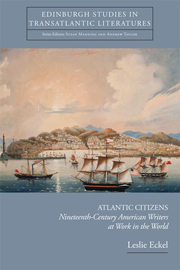Book contents
- Frontmatter
- Contents
- Acknowledgements
- Dedication
- Introduction: The Vocational Routes of American Literature
- 1 Longfellow and the Volume of the World
- 2 Fuller's Conversational Journalism: New York, London, Rome
- 3 ‘A type of his countrymen’: Douglass and Transatlantic Print Culture
- 4 Between Cosmos and Cosmopolis: Emerson's National Criticism
- 5 The Professional Pilgrim: Greenwood Sells the Transatlantic Experience
- 6 Standing Upon America: Whitman and the Profession of National Poetry
- Afterword: Vocation or Vacation? Transatlantic Professionalism Now
- Notes
- Bibliography
- Index
5 - The Professional Pilgrim: Greenwood Sells the Transatlantic Experience
Published online by Cambridge University Press: 05 September 2013
- Frontmatter
- Contents
- Acknowledgements
- Dedication
- Introduction: The Vocational Routes of American Literature
- 1 Longfellow and the Volume of the World
- 2 Fuller's Conversational Journalism: New York, London, Rome
- 3 ‘A type of his countrymen’: Douglass and Transatlantic Print Culture
- 4 Between Cosmos and Cosmopolis: Emerson's National Criticism
- 5 The Professional Pilgrim: Greenwood Sells the Transatlantic Experience
- 6 Standing Upon America: Whitman and the Profession of National Poetry
- Afterword: Vocation or Vacation? Transatlantic Professionalism Now
- Notes
- Bibliography
- Index
Summary
Who is ‘Grace Greenwood’? Dismissed as one of a great ‘mob of scribbling women’ by Nathaniel Hawthorne in 1855, relegated to the historical background of the antebellum literary world by foundational critics F. O. Matthiessen and Fred Louis Pattee, and then further marginalised by feminist scholars for employing sentimental language, Sara Jane Clarke Lippincott, or ‘Grace Greenwood’, as she was known to her reading public, has virtually disappeared from the drama of American literary innovation in which she once played a powerfully ‘paradigmatic’ role. An inheritor of Catharine Maria Sedgwick's gift for travel writing, Lydia Maria Child's skill in magazine editing, and Margaret Fuller's citizenship in the transatlantic world, Greenwood could count Hawthorne, Harriet Beecher Stowe, Fanny Fern, Walt Whitman, Mark Twain, and Nellie Bly among her literary and journalistic descendants. Given the company she kept and the professional influence she wielded, why have her writings and literary career remained buried for so long under accusations of flakiness, ‘fluffiness’, ‘absurdity’, and worse?
Greenwood challenges us to broaden our understanding of literary professionalism in the 1850s: a decade dominated by female novelists in fact and by Whitman and his male ‘American Renaissance’ cohort in retrospective fiction. For Greenwood, success in the publishing world depended not only on the quality of her writing, but also, more significantly, on her editorial ability to identify a niche market for her works and to promote them aggressively through personal networking and appeals to a broader reading public.
- Type
- Chapter
- Information
- Atlantic CitizensNineteenth-Century American Writers at Work in the World, pp. 127 - 152Publisher: Edinburgh University PressPrint publication year: 2013



